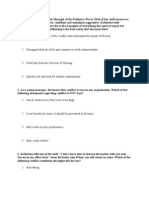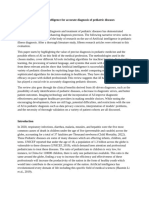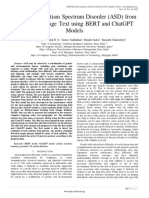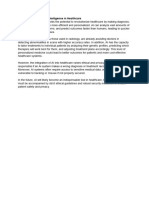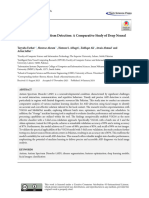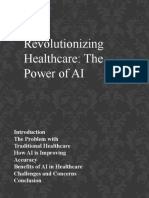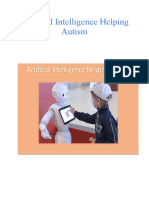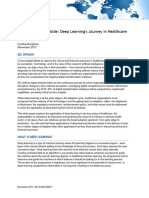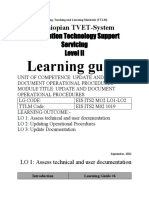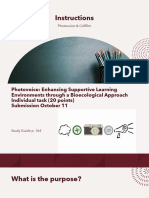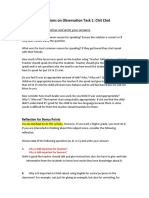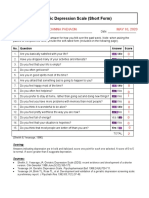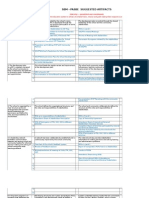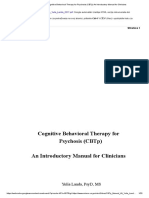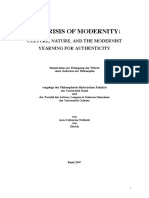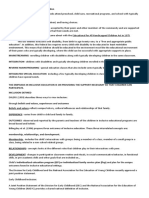Kaizen Article.
Kaizen Article.
Uploaded by
Santosh KulkarniCopyright:
Available Formats
Kaizen Article.
Kaizen Article.
Uploaded by
Santosh KulkarniOriginal Description:
Copyright
Available Formats
Share this document
Did you find this document useful?
Is this content inappropriate?
Copyright:
Available Formats
Kaizen Article.
Kaizen Article.
Uploaded by
Santosh KulkarniCopyright:
Available Formats
Artificial intelligence, an aid in autism assessment.
Artificial intelligence has become a very important alternative these days. This promising tool is
based on the human Bryan biological network and covers a variety of technologies that can
perform cognitive functions simply by mimicking human intelligence. Efforts to incorporate AI
into the healthcare sector are increasing. By leveraging information and building complex
models, AI could further help lay a strong foundation for better screening and diagnosis of
autism.
A very popular tool that is used is ADOS, which is a semi-
structured evaluation of the communication, the social interaction and the imagination
that is designed to diagnose children who belong at the autistic spectrum
To facilitate screening that is sensitive and specific, studies have used diverse AI methods on
the existing battery of assessments to build models that can be used to classify individuals with
autism. AI has been utilized to predict diagnostic outcomes using developmental evaluations
before the age of 3 years and enable more accurate predictions.To develop a more objective
method in identifying ASD, researchers have investigated the feasibility of using AI to capture
different types of behavioral features to use as valuable information in detecting characteristics
that are unique to individuals with the disorder.
implementing AI in the general healthcare system still faces numerous obstacles. One of the
difficulties we face when dealing with the children is to determine what they feel, especially
autistic children, as those with this disease suffer from a difficulty in accommodating to the
environment around them. One way to overcome this problem is by using assistive technologies
and finding ways how to benefit from the use of technology of intelligent systems to help these
children. An assistive smart environment has the effort to improve the quality of life for large
populations of users:
elderly, individuals with physical impairments, and individuals with cognitive disabilities and
developmental and social disorders
While machine learning algorithms heavily depend on the training dataset, there has not yet
been any extensive research assessing how the quality of the input data affects the accuracy or
targeting to establish a protocol on data collection and cleaning. Requiring vast amounts of
data, the ethical challenge around data privacy is also another topic that is under debate.
Being able to overcome these challenges to incorporate AI in clinical settings will not only
enhance our understanding of ASD, but also enable healthcare professionals to use this
technique as a clinical decision support system that can objectively intervene throughout the
screening, diagnosis, and treatment process.
To achieve more security for the data, cloud computing services can be used to improve the
results to be more accurate. Moreover, optimization algorithms can be performed to help
parents in improving the behavior of their Autistic children in an easy way using this technology.
You might also like
- Research PaperDocument83 pagesResearch PaperReylaine Mitz Baldon86% (7)
- NLM ExamDocument21 pagesNLM ExamGabriel San Pedro67% (3)
- R2A2 RelationshipsDocument1 pageR2A2 RelationshipsDenny Sheats100% (1)
- Sce NatioDocument2 pagesSce Natiod.petriashvili2023No ratings yet
- Research Paper PedsDocument3 pagesResearch Paper Pedsapi-735770422No ratings yet
- An_AI-Enabled_Internet_of_Things_Based_Autism_CareDocument12 pagesAn_AI-Enabled_Internet_of_Things_Based_Autism_CaresaishachakravartyNo ratings yet
- Ilovepdf Merged-4Document69 pagesIlovepdf Merged-4ruff ianNo ratings yet
- Medical Law 26.01.24Document16 pagesMedical Law 26.01.24Aathithya SampathNo ratings yet
- Artificial Intelligence For Accurate Diagnosis of Pediatric diseases-Feedback-SA-July28-2023Document10 pagesArtificial Intelligence For Accurate Diagnosis of Pediatric diseases-Feedback-SA-July28-2023ShahidNo ratings yet
- The Role of Artificial Intelligence in Mental HealDocument9 pagesThe Role of Artificial Intelligence in Mental HealTiago BastosNo ratings yet
- Ai & AsdDocument14 pagesAi & AsdJr. DzjokerNo ratings yet
- Big Data Refers ToDocument3 pagesBig Data Refers ToYvonne Vimel MarianoNo ratings yet
- Autism and AIDocument12 pagesAutism and AIMary Liliana Falcón LópezNo ratings yet
- 20230302114652PPTDocument38 pages20230302114652PPTPrajwal JrNo ratings yet
- Phase 3.doxDocument22 pagesPhase 3.doxriyadharsga99No ratings yet
- Artificial Intelligence in Health Professions EducationDocument3 pagesArtificial Intelligence in Health Professions EducationoperativedeptsbdcNo ratings yet
- IJCRT2209468Document8 pagesIJCRT220946823Riya Khot VcetNo ratings yet
- Artificial Intelligence in DiagnosticsDocument4 pagesArtificial Intelligence in DiagnosticssmileyNo ratings yet
- Full DocDocument32 pagesFull DocSunny PawasheNo ratings yet
- AI_in_Medical_DiagnosisDocument6 pagesAI_in_Medical_Diagnosisbishnoir814No ratings yet
- Major PPT Autism DetectionDocument12 pagesMajor PPT Autism Detectiongupta.2001karanNo ratings yet
- EthicsDocument2 pagesEthicsanastasis.martinos2No ratings yet
- Bridging The Gap AIs Role in Identifying and Addressing Research Gaps in Health SciencesDocument10 pagesBridging The Gap AIs Role in Identifying and Addressing Research Gaps in Health SciencesdrmamdouhphdNo ratings yet
- A Computational Intelligent Analysis of Autism Spectrum Disorder Using Machine Learning TechniquesDocument10 pagesA Computational Intelligent Analysis of Autism Spectrum Disorder Using Machine Learning TechniquesIAES IJAINo ratings yet
- Unit 3 Position PaperDocument3 pagesUnit 3 Position PaperVal Mercadal LeonardoNo ratings yet
- Artificial IntelligenceDocument11 pagesArtificial IntelligenceVaishnavi RameshNo ratings yet
- Blog ContentDocument6 pagesBlog ContentnatashaNo ratings yet
- Paper 41-Detection of Autism Spectrum DisorderDocument15 pagesPaper 41-Detection of Autism Spectrum DisorderRoman ClaudiaNo ratings yet
- Artificial Intelligence and Mental HealthDocument3 pagesArtificial Intelligence and Mental HealthankitaapsychNo ratings yet
- Report On Virtual Intervention For AutismDocument3 pagesReport On Virtual Intervention For AutismtherighttherapycentreNo ratings yet
- Implementasi Metode Forward Chaining Dan Certainty Factor Dalam Mendiagnosa Autisme Anak Berbasis WebDocument9 pagesImplementasi Metode Forward Chaining Dan Certainty Factor Dalam Mendiagnosa Autisme Anak Berbasis WebJurnal JTIK (Jurnal Teknologi Informasi dan Komunikasi)No ratings yet
- The Role of Artificial Intelligence in HealthcareDocument2 pagesThe Role of Artificial Intelligence in Healthcaresvidhi1312No ratings yet
- Ntcc Final ReportDocument17 pagesNtcc Final ReportJosué Claver MANAMOUNo ratings yet
- Loupiyuiyuthfgnbv 5 y 6 U 7 I 8Document1 pageLoupiyuiyuthfgnbv 5 y 6 U 7 I 8pedro.llo.herNo ratings yet
- AI - ChatGPT After Webinar EbookDocument18 pagesAI - ChatGPT After Webinar EbookAbhinavNo ratings yet
- 3Document2 pages3baochau19502No ratings yet
- Leonardo Position Paper Unit 3Document4 pagesLeonardo Position Paper Unit 3Val Mercadal LeonardoNo ratings yet
- The Impact of Artificial Intelligence On Modern HealthcareDocument3 pagesThe Impact of Artificial Intelligence On Modern HealthcareFerran MassoNo ratings yet
- Research Repor2Document4 pagesResearch Repor2vihaanmeraniNo ratings yet
- Artificial Intelligence in Healthcare Diagnosis TRDocument10 pagesArtificial Intelligence in Healthcare Diagnosis TRanupamabej6No ratings yet
- The Role of AI in HealthcareDocument2 pagesThe Role of AI in Healthcareabdelmajid.hamouti3No ratings yet
- Facial Image-Based Autism Detection A Comparative Study of Deep NeuralDocument22 pagesFacial Image-Based Autism Detection A Comparative Study of Deep NeuralprasannapotnuruNo ratings yet
- How Artificial Intelligence Is Disrupting Medicine and What It Means For Physicians - Reader ViewDocument3 pagesHow Artificial Intelligence Is Disrupting Medicine and What It Means For Physicians - Reader ViewShuaib KauchaliNo ratings yet
- My Final ReportDocument17 pagesMy Final ReportJosué Claver MANAMOUNo ratings yet
- Artificial Intelligence and Data Analytics in Sexual HealthDocument3 pagesArtificial Intelligence and Data Analytics in Sexual Healthbyfgal3No ratings yet
- AI in Healthcare - Revolutionizing Diagnosis and TreatmentDocument5 pagesAI in Healthcare - Revolutionizing Diagnosis and Treatmentjuliaevan3No ratings yet
- Revolutionizing Healthcare: The Power of AIDocument8 pagesRevolutionizing Healthcare: The Power of AIKshitij OvhalNo ratings yet
- SynopsisDocument6 pagesSynopsisVikas KumarNo ratings yet
- An Accessible and Efficient Autism Screening Method For Behavioural Data and Predictive Analyses - Fadi Thabtah, 2019Document22 pagesAn Accessible and Efficient Autism Screening Method For Behavioural Data and Predictive Analyses - Fadi Thabtah, 2019Andressa RovedaNo ratings yet
- Impact of AI On Mental Health Diagnosis and TreatmentDocument3 pagesImpact of AI On Mental Health Diagnosis and Treatmentvishruth92No ratings yet
- AI in Medicine Is Overhyped - Scientific AmericanDocument4 pagesAI in Medicine Is Overhyped - Scientific AmericanPatykNo ratings yet
- IntroductionDocument2 pagesIntroductionAlgo GCNo ratings yet
- AI in Mental Health - Use Cases, Opportunities, ChallengesDocument6 pagesAI in Mental Health - Use Cases, Opportunities, ChallengeskavitaperfectiongeeksNo ratings yet
- AI_in_Medical_Diagnosis_Updated (2)Document11 pagesAI_in_Medical_Diagnosis_Updated (2)bishnoir814No ratings yet
- Labeling Images With Facial Emotion and The Potential For Pediatric Healthcare - PMCDocument23 pagesLabeling Images With Facial Emotion and The Potential For Pediatric Healthcare - PMCatharv.choughuleNo ratings yet
- Artificial Intelligence Helping AutismDocument3 pagesArtificial Intelligence Helping Autismilyes bouallaguiNo ratings yet
- Formative Test English Sem IDocument5 pagesFormative Test English Sem Izkbc72vd5bNo ratings yet
- Pros & Cons of AI in HealthcareDocument7 pagesPros & Cons of AI in Healthcarejomarieneal84No ratings yet
- ProposalDocument11 pagesProposalredwan.ahmed.khan.2023No ratings yet
- 从实验室到病床:深度学习在医疗保健中的旅程Document11 pages从实验室到病床:深度学习在医疗保健中的旅程meiwanlanjunNo ratings yet
- Ai and AgeingDocument17 pagesAi and AgeingmishrakshamaaNo ratings yet
- Fin Irjmets1690473459Document7 pagesFin Irjmets1690473459Razmiya RameezNo ratings yet
- Data-Driven Healthcare: Revolutionizing Patient Care with Data ScienceFrom EverandData-Driven Healthcare: Revolutionizing Patient Care with Data ScienceNo ratings yet
- Festival Pascasiswazah Malaysia 2018-1Document28 pagesFestival Pascasiswazah Malaysia 2018-1Shaiful ShahidanNo ratings yet
- Understanding The Self Activity 1Document3 pagesUnderstanding The Self Activity 1Yuukee OliverosNo ratings yet
- Mini Riset PsikoDocument19 pagesMini Riset PsikoAndre SuhandiNo ratings yet
- TTLM CurriculumDocument26 pagesTTLM CurriculumEndale GirumeNo ratings yet
- Module 21 Student's Diversity in Motivation (Enero and Recilla)Document14 pagesModule 21 Student's Diversity in Motivation (Enero and Recilla)reimarjohnrNo ratings yet
- The Quantum Infinite Correlationalism, Contingency and NecessityDocument24 pagesThe Quantum Infinite Correlationalism, Contingency and NecessityfuturearunaNo ratings yet
- Chapter 14Document13 pagesChapter 14Ngọc NhiệmNo ratings yet
- FS1 ModuleDocument68 pagesFS1 ModuleniroannabellaNo ratings yet
- Tos Oral ComDocument1 pageTos Oral ComElectra AmorNo ratings yet
- Photovoice en Celfilm AssignmentDocument17 pagesPhotovoice en Celfilm AssignmentLwazi JiyaneNo ratings yet
- Task 5Document4 pagesTask 5api-307403208No ratings yet
- Safdie - Ion Mincu LectureDocument135 pagesSafdie - Ion Mincu LectureThe PrazilliaNNo ratings yet
- Software Engineering Solved MCQs (Set-1) PDFDocument6 pagesSoftware Engineering Solved MCQs (Set-1) PDFMantu KumarNo ratings yet
- Caregiver-Infant InteractionsDocument3 pagesCaregiver-Infant InteractionslolamcohnNo ratings yet
- Personality Analysis ProjectDocument5 pagesPersonality Analysis Projectzoha batoolNo ratings yet
- Flyer Triplet A4 V3Document2 pagesFlyer Triplet A4 V3Gisela GoncalvesNo ratings yet
- Geriatric Depression Scale (Short Form) : Joanna Padiaon MAY 10, 2020Document2 pagesGeriatric Depression Scale (Short Form) : Joanna Padiaon MAY 10, 2020Jess RitumaltaNo ratings yet
- Different Types of ThinkingDocument5 pagesDifferent Types of ThinkingEthan LawNo ratings yet
- MOANS Trails, Stroop, FASDocument52 pagesMOANS Trails, Stroop, FASJennifer CaussadeNo ratings yet
- Learning Episode 5: Creating An Appropriate Learning EnvironmentDocument13 pagesLearning Episode 5: Creating An Appropriate Learning EnvironmentMarwin Rebollos ApolinarioNo ratings yet
- SBM PASBE Artifacts FinalizedDocument24 pagesSBM PASBE Artifacts FinalizedDohly Bucarile95% (111)
- WOWWCSDocument6 pagesWOWWCSRICARD FERNANDEZ ESTERNo ratings yet
- Statement of PurposeDocument2 pagesStatement of PurposeAmbika AzadNo ratings yet
- Cognitive Behavioral Therapy For Psychosis (CBTP) An Introductory Manual For CliniciansDocument25 pagesCognitive Behavioral Therapy For Psychosis (CBTP) An Introductory Manual For CliniciansDragutin Petrić100% (1)
- Crisis of Modernity PDFDocument319 pagesCrisis of Modernity PDFAnonymous fuuA8ZP100% (1)
- Software Engineering Uml - Chapter I: B. WakimDocument9 pagesSoftware Engineering Uml - Chapter I: B. WakimSteven KhalifeNo ratings yet
- An Inclusive Approach To Early EducationDocument3 pagesAn Inclusive Approach To Early EducationtrinidadNo ratings yet

